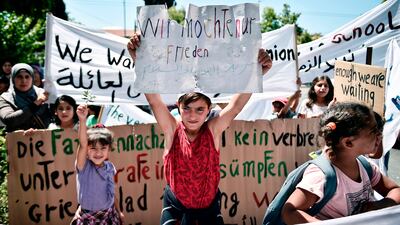Before the outbreak of civil war in Syria, Asma Al Assad told a visiting journalist that she and her husband, president Bashar Al Assad, wanted nothing more than to empower “young people to become active citizens, able to be part of the change the country’s going through”. When young Syrians spilled out into streets in 2011 and demanded change in a display of active citizenship, Mr Al Assad responded with brutality. At the time, Syrians between the ages of 10 and 24 accounted for 36.3 per cent of the country’s population, and Syrians aged 15-24 made up 22 per cent of the total population.
Syrians of all ages have been exposed to violence, loss and trauma under Mr Al Assad, but the war has had an especially devastating impact on the young. Half of all registered Syrian refugees — who now exceed 5 million — are children under the age of 18. An entire generation’s potential has effectively been immolated. Syria itself has been reduced to a moth-eaten entity, stuck between the savagery of ISIL and the viciousness of Mr Al Assad.
Young Syrians are now so demoralised that, according to a survey of refugees from that country, a majority don't want to return home even when the war ends. The findings, released yesterday, are the result of face-to-face interviews with 400 Syrian refugees aged 18-24 in Lebanon and Jordan as part of the Arab Youth Survey. Fifty-three per cent of the respondents in Jordan and 55 per cent in Lebanon said they were unlikely to return permanently to Syria. Canada, the United States and the UAE are the top three countries in which young Syrian refugees say they would like to rebuild their shattered lives.
It isn’t surprising that the UAE is a preferred destination for Syrians fleeing persecution. This is a tolerant land where people of all origins are afforded opportunities. More than 100,000 Syrians have been given residency since 2011, and over 240,000 Syrians live in the UAE, which last year became the first GCC country to lay out a major plan to grant asylum to their countrymen. As Reem Al Hashemy, the UAE’s minister of state for international cooperation, told a United Nations refugee summit last year, the diversity of the UAE serves as a “clear rebuttal to the global wave of xenophobia”. But coordinated global action is urgently required.
The results of the Arab Youth Survey remind us, lest we forget, of the human cost of Mr Al Assad’s actions. His determination to cling to power has so thoroughly destroyed Syria that the very thought of returning home terrifies the young men and women who were once its future.

